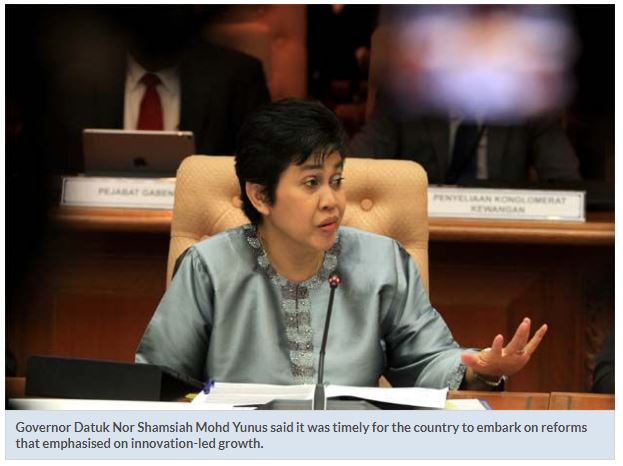Malaysia: Resetting economy for resilience
KUALA LUMPUR: The Covid-19 pandemic has provided Malaysia with an opportunity to reset and build stronger fundamentals on multiple fronts, says Bank Negara.
Governor Datuk Nor Shamsiah Mohd Yunus (pic) said it was timely for the country to embark on reforms that emphasised on innovation-led growth.
“The ‘3Ds’ of reforms which are accelerating digitalisation, rethinking downstreaming and reducing distortion will reset Malaysia towards higher quality growth.
“Being forward looking in the post-pandemic world is crucial and will require greater policy adaptability and flexibility to benefit from the rapid shifts in global trends, ” she said.
She was speaking at a virtual press conference in conjunction with the release of the central bank’s Annual Report 2020, Economic and Monetary Review 2020 and the Financial Stability Review for Second Half 2020.
Nor Shamsiah stressed that structural reforms will place Malaysia in a better position to secure a durable economic recovery with a resilient workforce, innovation led growth and social protection for those in need.
“As economic growth becomes more entrenched, the rebuilding of the overall policy space including monetary, financial and fiscal buffers are necessary to ensure that we have adequate room to maneuvre if the economy faces another shock.
“At the same time, structural reforms related to the labour market, innovation and social protection will be critical to ensure that Malaysia emerges stronger in the post-pandemic future.
“Most importantly, this will allow us to achieve the kind of quality growth that typically defines a high-income economy, with several critical hallmarks such as more sophisticated and diversified industries, high standard of living and a first-class civic society with strong value systems, ” she said.
Bank Negara has projected that the Malaysian economy will rebound and grow between 6% and 7.5% in 2021, with a rebound expected from the second quarter.
This will be driven by improved external demand, pickup in investment and production activities and support from policy measures.
The expected rebound of global growth this year will drive a strong recovery in exports, particularly electrical and electronics (E&E) products, on the back of the technology cycle.
Private consumptions will also be supported by the gradual improvement in labour market conditions amid the relaxation of containment measures, improving consumer sentiments from the vaccine rollout and continued policy support that remains available particularly for vulnerable households.
Investment activities are also expected to pick up following the lifting of movement restrictions as well as favourable external demand conditions.
Nor Shamsiah said progress was also expected in multi-year infrastructure projects such as the East Coast Rail Link (ECRL), MRT2, LRT3 and the Pan Borneo Highway.
“We also expect the positive growth momentum to be sustained in 2022, supported by further expansion in global growth.
“As we reach herd immunity, pent-up demand in leisure and travel-related spending will further lift the recovery, ” she said.
Malaysia’s economic growth may, however, be tilted towards the lower bound of the central bank’s forecast if downside risks materialise.
Deputy governor Datuk Abdul Rasheed Abdul Ghaffour (pic below) said risks in 2021 remained on the downside mainly from the ongoing uncertainties surrounding the pandemic and potential challenges that might affect the rollout of vaccines, both globally and domestically.
An example, he said, was the blockage in the Suez Canal last week. “Commodity supply shocks can happen anytime and anywhere and this can impact global trade.
“Favourable development surrounding the distribution and effectiveness of the vaccines can also lift sentiments and consumption spending and accelerate the rollback of containment measures.
“This will also lift income and promote a faster recovery in the high-touch sectors, ” he said.
While heightened downside risks to growth remain, the immediate policy focus of Bank Negara is to facilitate a strong and sustainable recovery and minimise permanent output losses.
Apart from fiscal measures, Nor Shamsiah said monetary policy in 2021 will remain accommodative and financing conditions are supportive of an enhanced and sustained economic growth.
“Given ongoing uncertainties surrounding the pandemic, the stance of monetary policy, going forward, will continue to be determined by new data and information.
“In view of the higher headline inflation being driven by supply side factors, monetary policy as the demand management tool will not be appropriate to manage this.
“Monetary policy in 2021 will remain accommodative to support the economic recovery while ensuring price pressures remain manageable, ” she said.
Nor Shamsiah added that Bank Negara has been and will continue to utilise its policy levers as appropriate to ensure the right mix of policies in supporting a sustainable economic recovery.
“Monetary policies will continue to be complemented by the bank policy tools such as liquidity operations, appropriate regulatory and supervisory measures, establishments of targeted financing facilities as well as other financial sector policies, ” she said.
Headline inflation is forecast to average higher in 2021 between 2.5% and 4% on the back of expected higher global oil prices and the lapse in the electricity tariff rebate introduced last year.
In terms of trajectory, the central bank said the headline inflation is expected to rise further in March and is anticipated to temporarily spike above 5% in the second quarter of 2021.
“A key assumption is that the Ron 95 retail fuel price remains at a price ceiling of RM2.05 per litre in the second quarter.
“The spike is driven by the lower base from the low domestic fuel prices last year which averaged at RM1.37 per litre. This is temporary. The headline inflation is expected to moderate thereafter, ” she said, adding that the underlying inflation is expected to remain subdued amid the continued spare capacity in the economy, forecast to average between 0.5% and 1.5%.
Nor Shamsiah emphasised that the spike in headline inflation was only temporary and such a situation was also observed in the United Kingdom, the eurozone and the Philippines, which were facing an increase in inflation due to higher energy prices.
Source: https://www.thestar.com.my/business/business-news/2021/04/01/resetting-economy-for-resilience


 Thailand
Thailand





